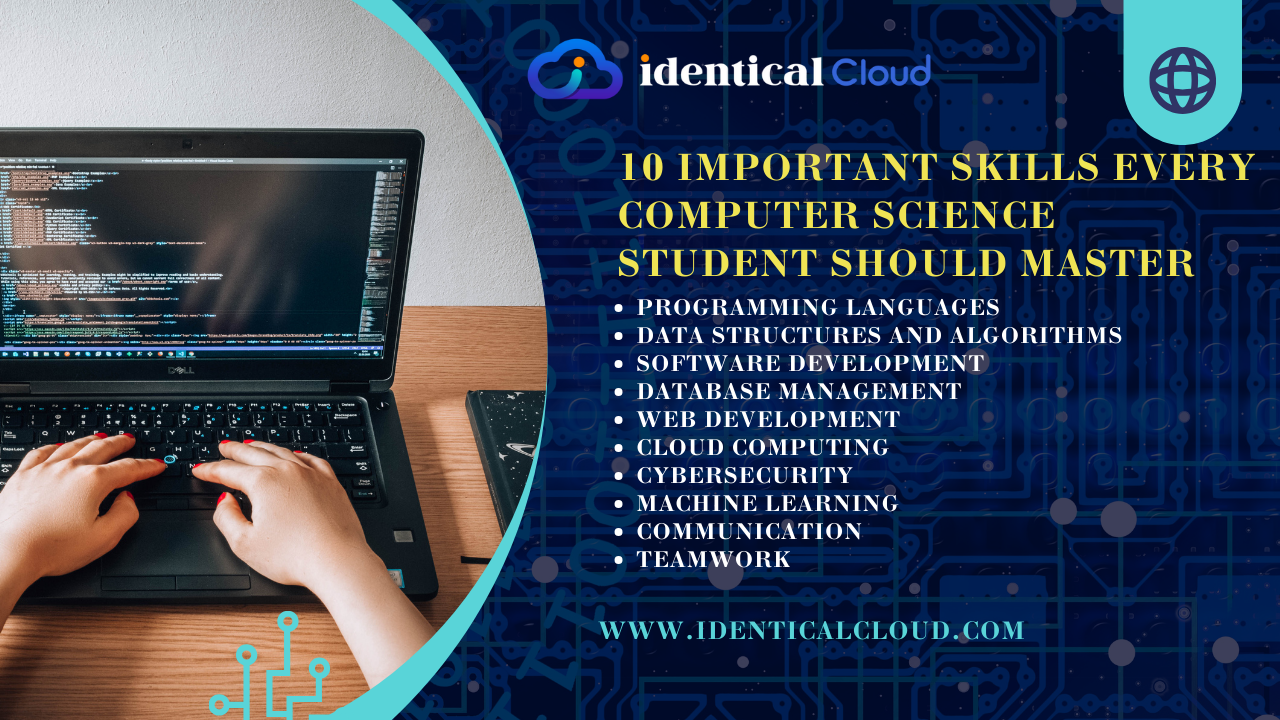
10 Important skills Every computer science student should master
10 Important skills Every computer science student should master
Computer science is a vast and ever-evolving field, but there are some core skills that every computer science student should master. These skills will serve you well in your studies, your job search, and your career.
Here are 10 important skills that every computer science student should master:
1. Programming languages
There are many different programming languages, each with its own strengths and weaknesses. Some of the most popular programming languages for computer science students include:
- Python: Python is a general-purpose programming language that is known for its simplicity and readability. It is a good choice for beginners and experienced programmers alike.
- Java: Java is a general-purpose programming language that is known for its portability and security. It is widely used in enterprise applications and mobile development.
- C++: C++ is a powerful and versatile programming language that is used in a wide variety of applications, including operating systems, games, and embedded systems.
- JavaScript: JavaScript is a front-end programming language that is used to create interactive web pages and web applications. It is also used in server-side development with Node.js.
2. Data structures and algorithms
Data structures are the ways in which data is organized in a computer. Some common data structures include arrays, linked lists, trees, and graphs. Algorithms are the steps that a computer follows to process data. Some common algorithms include sorting, searching, and graph traversal.
A good understanding of data structures and algorithms is essential for any computer scientist. It allows you to write efficient and scalable code.
3. Software development
Software development is the process of creating and maintaining software applications. It involves a variety of tasks, such as:
- Requirements gathering: Understanding what the user wants the software to do.
- Design: Creating a plan for how the software will be implemented.
- Coding: Writing the software in a programming language.
- Testing: Ensuring that the software works as expected.
- Deployment: Making the software available to users.
Software development is a complex process, but it is essential for creating high-quality software applications.
4. Database management
Databases are used to store and organize data. Database management systems allow users to access and manipulate data in a database. Some common database management systems include MySQL, PostgreSQL, and Oracle Database.
A good understanding of database management is essential for any computer scientist who needs to work with data. It allows you to design and implement efficient database solutions.
5. Web development
Web development is the process of creating and maintaining websites. It involves a variety of technologies, such as:
- HTML: HTML is the markup language that is used to create the structure of a web page.
- CSS: CSS is the style sheet language that is used to control the appearance of a web page.
- JavaScript: JavaScript is the programming language that is used to add interactivity to web pages.
- Server-side programming languages: Server-side programming languages, such as PHP and Python, are used to create dynamic web pages and web applications.
Web development is a rapidly growing field, and there is a high demand for skilled web developers.
6. Cloud computing
Cloud computing is the delivery of computing services over the internet. Cloud computing services include storage, processing, and applications. Some popular cloud computing platforms include Amazon Web Services (AWS), Microsoft Azure, and Google Cloud Platform.
Cloud computing is a rapidly growing field, and it is essential for any computer scientist to have a basic understanding of cloud computing concepts and technologies.
7. Cybersecurity
Cybersecurity is the practice of protecting computers and networks from attack. Cybersecurity professionals use a variety of tools and techniques to protect systems from malware, hackers, and other threats.
Cybersecurity is a critical field, and there is a high demand for skilled cybersecurity professionals.
8. Machine learning
Machine learning is a field of computer science that allows computers to learn without being explicitly programmed. Machine learning is used in a variety of applications, such as facial recognition, natural language processing, and fraud detection.
Machine learning is a rapidly growing field, and there is a high demand for skilled machine learning engineers.
9. Communication
Computer scientists need to be able to communicate effectively with both technical and non-technical audiences. This includes being able to write clear and concise documentation, give presentations, and collaborate with others.
Communication is an essential skill for any computer scientist, regardless of their job title or industry.
10. Teamwork
Computer scientists often work on teams to develop and maintain software applications. It is important to be able to work effectively with others and contribute to a team effort.
Teamwork is an essential skill for any computer scientist who wants to be successful in their career.
Additionally, it’s essential for computer science students to stay updated with the latest trends and technologies in the field, as the industry evolves rapidly. This might include learning about cloud computing, artificial intelligence, machine learning, DevOps practices, and more, depending on your career interests.
Remember that mastery of these skills often comes with continuous practice, real-world experience, and a passion for learning. Whether you’re pursuing a career in software development, data science, artificial intelligence, or any other computer science specialization, these foundational skills will serve as a strong basis for your future success.
